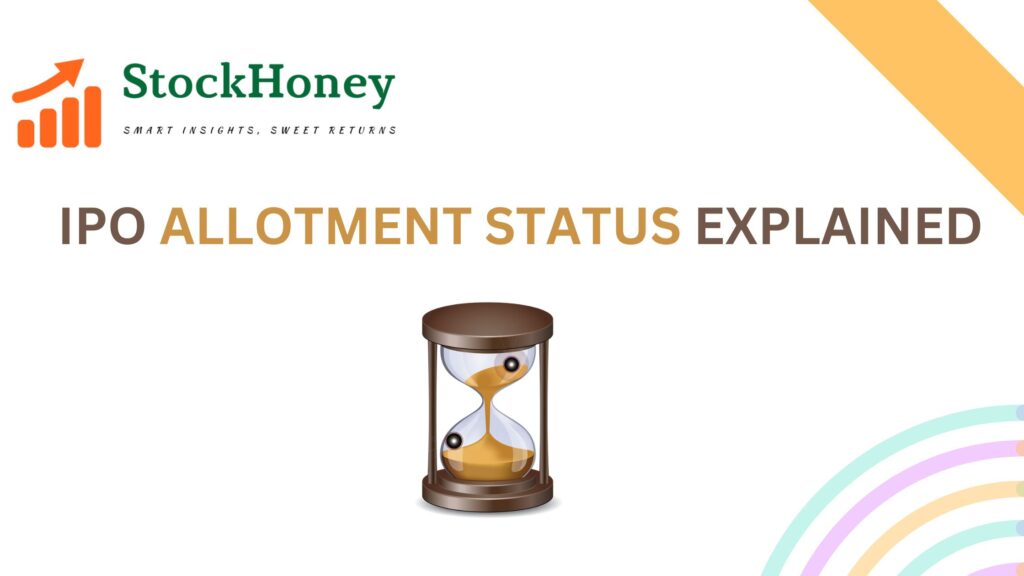One of the most eagerly awaited news for an investor in the IPO investment process is the announcement of the allotment status for the IPO the investor has applied for. Be it a new investor or an experienced one knowing how the allotment process of an IPO works is the key to an investment journey. It helps to know if the investor will receive the shares he has applied for and how many shares he will get. The IPO allotment status is often a period of uncertainty for retail investors, especially when the IPO is oversubscribed.
In this article, we will explain how the IPO allotment process works, the factors behind the allotment, and how to check the allotment status. Knowing this information will save you from unnecessary stress about the allotment process by helping you manage expectations more effectively.
What is the IPO Allotment Status?
IPO allotment status refers to the outcome of your application for an IPO. It shows whether or not you have been allotted shares from the IPO and, if so, how many shares you will get. The allotment is an important confirmation step in the IPO process to know if you have been granted the shares you have applied for.
The registrar of the IPO handles the entire application and allotment process. Once the allotment process is over and the final list is prepared the allotment status is shared with the investors. In case of successful allotment, the shares are directly credited to the demat account of the investor, if there is no allotment the application amount is released back to the investor.
How is the IPO Allotment Decided?
The IPO allotment process is primarily decided by two main factors 1) The type of investors and 2) The level of subscription
1. Category of Investors
- Retail Investors: These are generally individual investors, who can apply for shares up to a certain limit (usually Rs 2 lakhs)
- Non-Retail Investors: This includes Qualified Institutional Buyers (QIBs) and High Net-Worth Individuals (HNIs). These investors apply for large blocks of shares.
2. Subscription Level
- Under-Subscribed: If the IPO is under-subscribed, the demand for shares is less than the number of shares available. The process of allotment is straightforward and all the investors will get the shares they have applied for.
- Over-Subscribed: If the IPO is over-subscribed, meaning the demand for the shares is more than the available number of shares, then the process of allotment becomes a bit more complex. In this case, the allotment could either be done by lottery system or proportional allotment depending on the investor category and the level of over-subscription.
Let us understand the IPO allotment for the above two categories
Retail Investors
- If the IPO is under-subscribed then all the retail investors, who have applied for the IPO will get the shares.
- If the IPO is over-subscribed then the shares are allotted by a lottery system. The registrar of the IPO conducts the lottery.
Example: If the IPO offers 10 lakh shares to the retail investors and retail investors apply for 5 lakh shares, then all the investors get the shares they have applied for.
If the IPO offers 10 lakh shares and retail investors apply for 20 lakhs, then the shares are allocated by lottery system. In a lottery system although all retail investors get a fair chance of receiving allotment, not all retail investors who have applied will get the allotment.
For Non-Retail Investors (QIBs and HNIs):
- For QIBs: if the IPO is under-subscribed they will get the shares applied for. In case of over-subscription, the shares are allotted on a proportional basis. They will receive a share of the available IPO shares proportional to the number of shares they have applied for.
- For HNIs: If the IPO is over-subscribed, allotment is done on a proportional basis or through a lottery if the IPO is highly over-subscribed in this category.
Steps In The IPO Allotment Process
After the completion of the subscription period, the IPO registrar starts the allotment process. Here are the steps:
- Subscription Status: The first step in the process is determining the subscription levels for each category of investors. For example, if the company is offering 1 crore shares and the bid is for 5 crore shares, the IPO is said to be 5 times oversubscribed. Higher over-subscription levels lead to a lower probability of getting the allotment.
- Lottery System for Retail Investors: In case of over-subscription the registrar will use the lottery system to determine which applicants will receive the shares. Since there are more bids for the shares than those available, many retail investors will not receive the shares they applied for.
- Pro-Rata Allotment for NIIs and QIBs: In comparison to retail investors, the allotment process is slightly different in the case of QIBs and NIIs. In the case of over-subscription, the allotment happens on a proportional basis.
- Allotment Confirmation: After the allotment process is completed, the registrar shares the final list of successful applicants. In case of successful allotment, the status will indicate the number of shares you have received. If there is no allotment of any shares, the status will show “No Allotment.”
- Refund Process: For unsuccessful applicants, the application money is refunded. The refund process is usually completed within a few days after the IPO allotment is completed.
Factors Influencing IPO Allotment Chances
There are several factors impacting the chances of getting an IPO allotment. Let us discuss a few of these factors.
Over-Subscription
This is one of the main factors influencing the chances of getting an allotment. An IPO is said to be over-subscribed when the demand for the shares exceeds the number of shares available. In the case of over-subscription, for retail investors, the allotment happens on the basis of the lottery system, while in the case of QIBs and HNIs, it is done on a proportional basis.
Application Size
For retail investors applying for a larger number of shares does not increase the chances of getting an allotment in oversubscribed IPO. The allotment is done on the basis of a lottery system, where each applicant regardless of the size of the application (within Rs 2 lakh limit), has an equal chance of getting one lot of shares.
For QIBs and HNIs, the allotment is done proportionally, so applying for a large number of shares increases the chances of getting more shares, in case of over-subscription.
Category of Investor
The investor category significantly impacts the chances of getting an allotment. For retail investors, since the allotment happens by a lottery system for over-subscription, not all retail applicants will be successful in getting the allotment. QIBs and HNIs on the other hand have a fair chance of getting allotment as it is done on a proportional basis.
Timing of Application
While the timing of the application does not directly influence the allotment, applying earlier ensures there are no technical glitches or delays that could disqualify the application.
How to Check IPO Allotment Status?
An investor can check the IPO allotment status by visiting the official registrar’s website. Here’s how you can check the allotment status.
- Visit the Registrar’s Website: Each IPO has a registrar. Visit the website of that particular registrar to know the allotment status. The most common registrar in India for IPO Link Intime and KFin Technologies.
- Enter Application Details: To check your allotment status, you will need your IPO application number, PAN number, or Demat account number. Ensure that you have the correct details.
- View IPO Allotment Results: Select the IPO you applied, enter your details and you will be able to see the allotment result. If your application is successful, the number of shares allotted will be shown. If you have not been allotted shares, the status will indicate “No Allotment.”
- Refund Process: If there is no allotment, the application money will be refunded to your bank account. The refund typically happens within 3-7 days after the allotment results are announced.
Conclusion
For any investor, understanding the allotment process of an IPO is vital. Whether you are an investor investing in an IPO for the first time or have already done it before, the knowledge of the allotment process and how it affects the allotment will surely help you keep your expectations realistic. While you may not receive the allotment each time you apply for an IPO, staying informed and prepared will improve your chances of succeeding in the IPO market.
Happy Investing!
Related Information & Articles
Current & Upcoming IPOs in India
8 Case Studies – Successful and Failed IPOs
Don’t Miss – Tax Implications of Investing in IPOs in India
Important Role of Anchor Investors in IPOs


